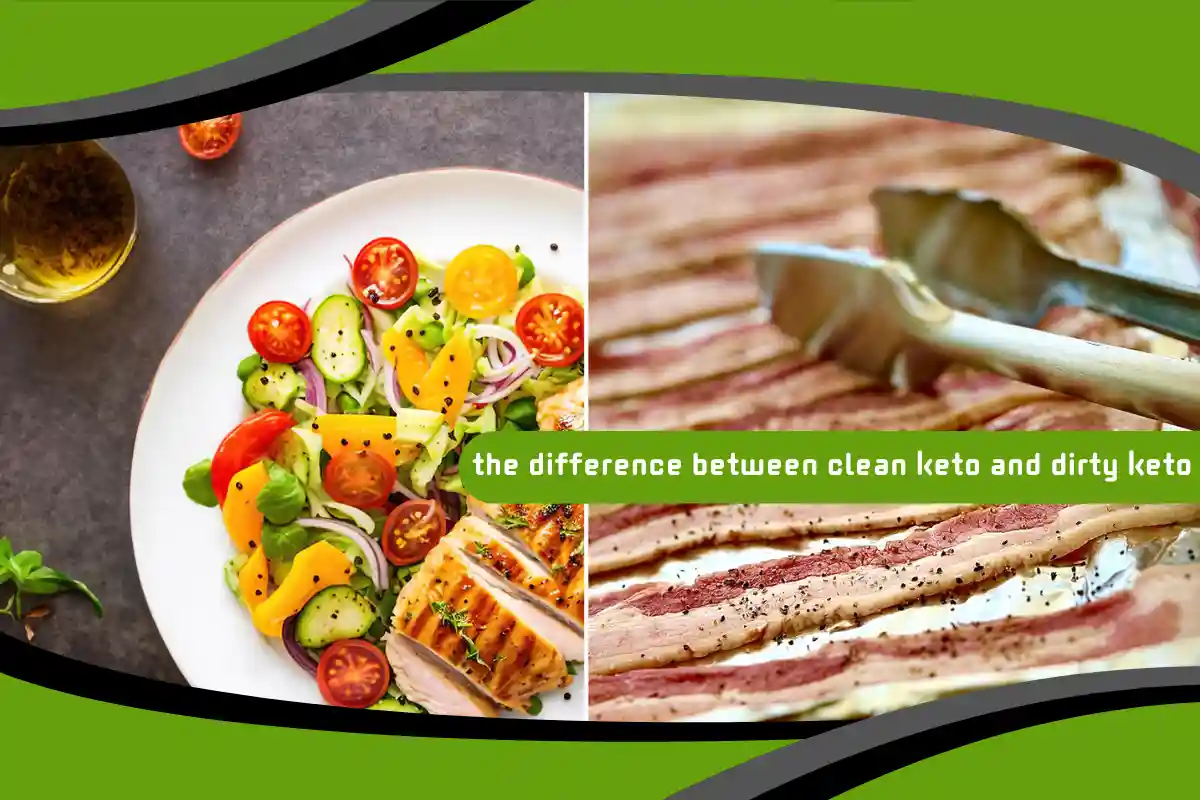The ketogenic diet, or keto, has become one of the most popular methods for weight loss and improving overall health. However, within the keto community, there are two primary variations: clean keto and dirty keto. Both are based on the principle of drastically reducing carbohydrate intake while increasing fats and moderate protein consumption. Despite their similarities, the key difference lies in the quality of food choices. This article will delve into the contrasting features of clean keto and dirty keto, exploring their benefits, drawbacks, and long-term effects on health.

Defining Clean Keto
Clean keto focuses on the consumption of whole, nutrient-dense foods that align with the principles of a ketogenic diet. This approach emphasizes the importance of eating high-quality fats, organic meats, non-starchy vegetables, and healthy oils while avoiding processed foods.
Defining Dirty Keto
Dirty keto, on the other hand, allows for more flexibility in food choices. It doesn’t prioritize the quality of ingredients as much as clean keto does. Instead, dirty keto emphasizes macronutrient ratios—high fat, moderate protein, and low carbs—without necessarily focusing on the nutritional value of the foods consumed.
The Role of Whole Foods in Clean Keto
One of the main tenets of clean keto is eating whole, minimally processed foods. This includes grass-fed beef, wild-caught fish, organic vegetables, and avocados. The goal is to ensure that the body receives maximum nutrients from every bite.
Watch also: What to Expect in Your First Week on Keto: A Complete Guide for Beginners
Processed Foods in Dirty Keto
In contrast, dirty keto allows for processed foods, provided they meet the macronutrient requirements. This means that someone on a dirty keto plan might consume packaged snacks, processed meats like bacon, or even fast food, as long as it fits into their daily carb limit.
Health Benefits of Clean Keto
Clean keto offers numerous health benefits. Because it focuses on nutrient-dense foods, it helps ensure that the body receives adequate vitamins, minerals, and fiber. This can lead to improved digestion, better immune function, and long-term health maintenance.
Potential Health Risks of Dirty Keto
Dirty keto may not provide the same nutritional benefits as clean keto. Consuming processed foods regularly can lead to deficiencies in important micronutrients, increase inflammation, and even contribute to chronic diseases like heart disease and diabetes due to unhealthy fat and sodium intake.
Impact on Weight Loss: Clean vs. Dirty Keto
When it comes to weight loss, both clean and dirty keto can be effective. However, clean keto may provide better results in the long run. The nutrient-dense nature of clean keto helps regulate appetite, stabilize blood sugar levels, and improve metabolism, all of which contribute to sustainable weight loss.
Long-Term Sustainability of Clean Keto
Clean keto is often considered a more sustainable lifestyle choice. Since it focuses on whole foods, it encourages a balanced, nutrient-rich diet that can be maintained over time without the negative health consequences associated with processed foods.
Challenges of Dirty Keto for Long-Term Health
While dirty keto may show quick results in weight loss, its long-term effects on health can be concerning. The consumption of processed foods and unhealthy fats can lead to heart problems, poor gut health, and an increased risk of metabolic diseases.
The Nutritional Quality of Fats in Clean Keto
In clean keto, the fats you consume come from healthy sources like avocado, olive oil, nuts, and fatty fish. These fats are rich in omega-3 fatty acids and other essential nutrients that promote heart health and reduce inflammation.
The Quality of Fats in Dirty Keto
Dirty keto often includes lower-quality fats, such as those found in processed meats, packaged snacks, and fast food. These fats tend to be high in trans fats and omega-6 fatty acids, which can contribute to inflammation and an increased risk of cardiovascular diseases.
The Importance of Fiber in Clean Keto
Fiber is an essential nutrient often overlooked in many diets, but it plays a significant role in clean keto. Non-starchy vegetables, nuts, and seeds provide fiber that helps regulate digestion, control blood sugar levels, and maintain healthy gut flora.
Fiber Deficiency in Dirty Keto
Dirty keto can often lead to a fiber deficiency, as it may not include enough vegetables, nuts, or seeds in the diet. This can cause digestive issues, constipation, and even more serious long-term health problems like gut dysbiosis and an increased risk of colon cancer.
Clean Keto and Mental Clarity
One of the reported benefits of clean keto is improved mental clarity and focus. This is due to the high-quality fats and nutrient-rich foods consumed, which help fuel the brain and support cognitive function.
Watch also: Understanding Macros for Keto: Fats, Proteins, and Carbs Explained for Effective Weight Loss
Mental Fog on Dirty Keto
On the other hand, dirty keto may lead to mental fog or decreased cognitive function. The consumption of processed foods and unhealthy fats can affect brain health and lead to mood swings, irritability, and a lack of concentration.
The Environmental Impact of Clean Keto
Clean keto often includes organic, sustainably sourced food, which can have a smaller environmental impact compared to dirty keto. Organic farming practices help reduce chemical exposure, promote biodiversity, and lower carbon footprints.
Dirty Keto’s Environmental Footprint
Dirty keto may involve higher consumption of factory-farmed meat, processed foods, and items with excessive packaging. This can have a larger environmental impact, contributing to deforestation, higher carbon emissions, and increased waste production.
Social and Lifestyle Considerations: Clean Keto
Clean keto can be more socially and lifestyle-friendly, as it encourages the consumption of fresh, whole foods. It’s easier to enjoy clean keto at home with family and friends, and many restaurants now offer keto-friendly, clean food options.
Social and Lifestyle Considerations: Dirty Keto
Dirty keto can be more convenient, especially for those who are busy or do not have the time to prepare whole foods. However, it may limit social interactions, as eating out at most places might not always align with the strict macronutrient ratios of the diet.
Which Keto Approach is Right for You?
Choosing between clean keto and dirty keto ultimately depends on your personal goals and lifestyle. If you are looking for long-term health benefits and sustainability, clean keto is likely the better choice. However, if you are seeking a more flexible, short-term approach to weight loss, dirty keto might be a more suitable option.
Conclusion: The Better Path to Wellness
Both clean keto and dirty keto can be effective for weight loss and achieving ketosis, but clean keto stands out as the healthier, more sustainable option in the long run. By prioritizing whole foods and nutrient-dense ingredients, clean keto offers significant benefits to both physical and mental health. While dirty keto may provide quick results, it lacks the nutritional depth required for long-term well-being. Ultimately, the best approach to keto is one that aligns with your health goals, values, and lifestyle.
Watch also: How to Track Your Macros on a Keto Diet: The Ultimate Guide for Success



No comment